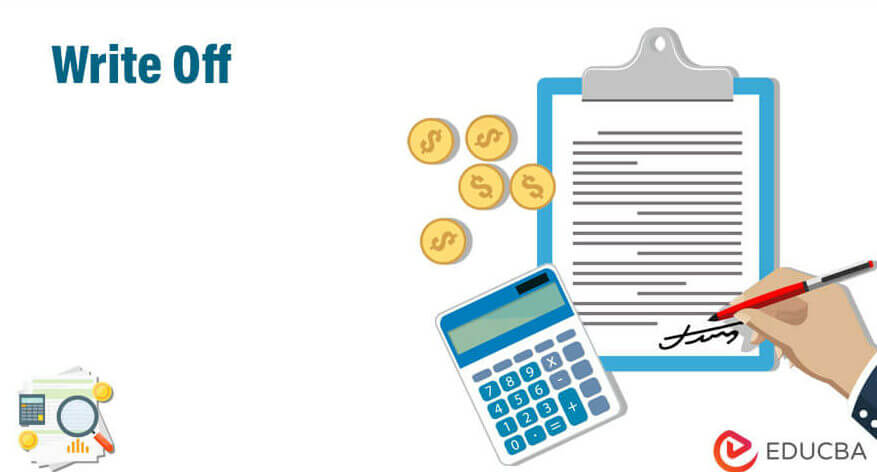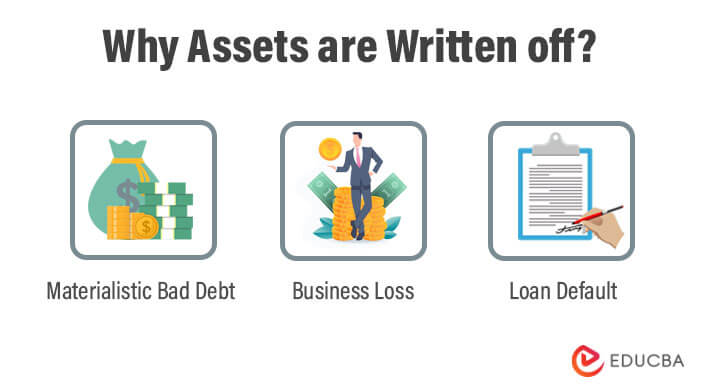Updated July 19, 2023

What is Write Off?
Write Off is a terminology that is widely used in the field of accounting which means to reduce the value of something, typically an asset to a significant amount while parallelly debiting the liabilities account too in the same manner and it is widely used by businesses to support the accounting for unpaid loan obligations, unpaid receivables, bad debt or loses made on stored inventories.
Explanation of Write off
Write off typically means reducing the value of an asset and on a parallel note debiting the liabilities account in the books of account. Write off in one way can prove advantageous to the company in the form of taking tax advantage. The business will generally use this concept to provide the accounting for losses made on assets due to various circumstances. The two generally practiced methods in business accounting for implementing write off to assets are the direct write off method and the allowance method. The journal entries to be used for each of the methods will differ depending on the scenario.
Generally, the three most common scenarios for which write off need to be made are unpaid bank loans, unpaid receivables, and losses made on inventory which are stored. Banks will simply write-offs to their books when they have exhausted all their efforts to collect payments. This is generally monitored by matching the organization’s loan loss reserves. Loan loss reserves act as a projected amount for losses on unpaid debts whereas write-off is the final action point that is taken for such losses. Similarly, in business write-offs are common when a customer is not going to pay the bill.
This is primarily shown on the balance sheet which involves a debit to the unpaid receivables account which is the liability and a similar credit amount to the account receivables. Lastly, when it comes to losses made to stored inventory the accounting treatment goes as an expense debit for the value of inventory that cannot be used further and a credit entry to the overall inventory.
Example of Write off
One of the most common examples, when it comes when we think of write off, is bad debt. Bad debt is something that is faced by all businesses at some point in time. Bad debt is an account receivable for which the business will no longer receive the payment. In simple words, a customer who owes money to the business will either deliberately not pay the money to the business or is in a position where he/she is unable to pay the sum. The business waits for some time and rather than keeping this receivable in its books decides finally to write off the receivables. There are generally two methods to write it off which are direct write off and the allowance method.
Another example can be a business that has suffered a loss due to one of its storage units getting destroyed due to a natural calamity. The business in such a case will write off the building from its books and will account for it as a casualty loss. At times companies get insurance money from insurers in cases of insured properties to offset the corresponding casualty loss or written off amount. Even in such cases, the assets are still removed from the books because they cease to exist any further.
Write Off in Accounting
In accounting a write off is a reduction to the value of an asset and at par debiting the liabilities account. A write off occurs when a business realizes that it can no longer convert an asset into cash or is of no use to the business or lastly has zero market value. Write off is brought into practice by transferring some or the entire balance of an asset to an expense account. The accounting henceforth will differ based on the type of asset which is involved. A few scenarios which can be discussed on this ground are as follows:
- In cases when the account receivable is not in a state to be collected, this is usually net off against the allowance provided for doubtful accounts or a contra account.
- When the inventory is of no use at all it can be charged on a direct basis to the cost of goods sold or else it can be net off by another contra entry against the reserves for inventories.
- When a fixed asset is no longer in use this is netted off against accumulated depreciation or accumulated appreciation with the balance being transferred to a loss account.
- When an advance payment cannot be transformed into cash it is charged to a compensation expense.
Why Assets are Written off?

Assets are written off on account for the following reasons:
- When a business realizes a materialistic bad debt and thus accepts the fact that the payment from a customer cannot be collected going forward it will write off the account receivable.
- When a business suffers loss made to the inventories, the business will write off that much amount of inventories and charge it to the cost of goods sold directly.
- In banks when the bank has given loan to a customer and he turns defaults, the bank will first turn that asset into NPA and eventually within the stipulated time will write it off.
Advantages
- One prime advantage of write off is tax saving where businesses can save tax by claiming the write offs and losses and lowering the net income
- It saves a lot of time for the business where it no longer has to wait for customers to make the payment knowing that it will never come.
- It is a simple recording in the books of account and can be implemented just by passing two entries.
- It amortizes the inherent risk by making provisions for the losses.
Disadvantages
- Businesses with rich cash will never try to put efforts into the collection of failed payments and directly go for write offs.
- In the longer term, continuous write off is not perceived as an efficient activity and raises questions about the cash collection methodology of the business.
- Write off even if we use or pronounce it differently, it is what we mean a loss to the business.
- It overstates account receivables and violates GAAP or matching principle
- It brings about balance sheet inaccuracy.
Conclusion
Write off as discussed above is something that is inevitable for all businesses, but the business should be efficient enough to minimize the same and avoid it on a regular basis. Though from the tax point of view it is advantageous to the business in the long run, it is still treated as a loss-making activity.
Recommended Articles
This is a guide to Write off. Here we discuss the definition and examples of write off along with their advantages and disadvantages. You may also have a look at the following articles to learn more –


